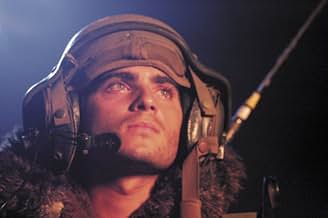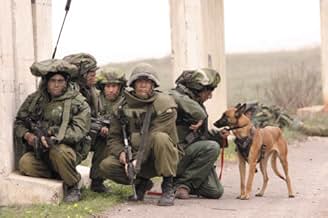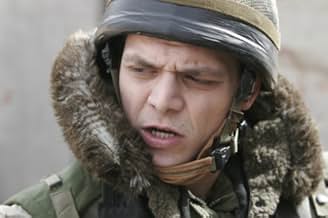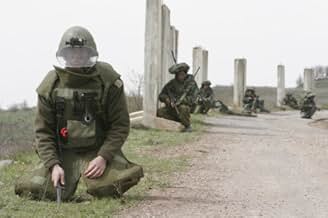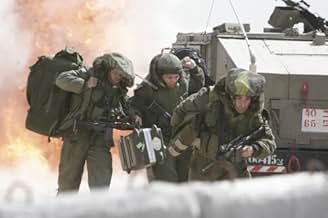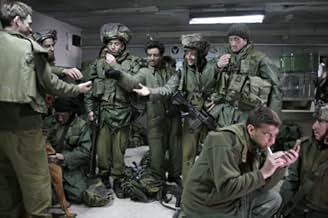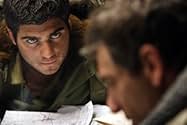Agrega una trama en tu idiomaThe story of a group of Israeli soldiers stationed in an outpost prior to the withdrawal of forces of 2000.The story of a group of Israeli soldiers stationed in an outpost prior to the withdrawal of forces of 2000.The story of a group of Israeli soldiers stationed in an outpost prior to the withdrawal of forces of 2000.
- Dirección
- Guionistas
- Elenco
- Nominado a 1 premio Óscar
- 5 premios ganados y 9 nominaciones en total
Arthur Perzev
- Yonatan Shpitzer
- (as Arthur Faradjev)
Zohar Strauss
- Rossman
- (as Zohar Shtrauss)
Ya'akov Ahimeir
- Self
- (as Yaakov Ahimeir)
- Dirección
- Guionistas
- Todo el elenco y el equipo
- Producción, taquilla y más en IMDbPro
Opiniones destacadas
It's about Israeli soldiers holding down a fort in Southern Lebanon, but it could be about soldiers anywhere. That is what makes this film so memorable.
Lebanon, Afghanistan, Bosnia, Iraq, it is all the same when it comes to politics and the soldiers that have to carry out the policies made by chickenhawks far removed from the front.
It is touching and funny at times. I could really relate to the truck arriving with fresh supplies after a long wait. It is common and a hot meal at midnight is much appreciated when you have been running low.
It shows real soldiers doing real grunt work. It is an outstanding film.
Lebanon, Afghanistan, Bosnia, Iraq, it is all the same when it comes to politics and the soldiers that have to carry out the policies made by chickenhawks far removed from the front.
It is touching and funny at times. I could really relate to the truck arriving with fresh supplies after a long wait. It is common and a hot meal at midnight is much appreciated when you have been running low.
It shows real soldiers doing real grunt work. It is an outstanding film.
Right-wing audiences have criticized "Beaufort" for being left-winged, while left-wing audiences have criticized the movie for being right-winged. Immediately that should tell you this is a movie worth watching.
Like all great war films, "Beaufort" avoids situational politics and instead focuses on the broader, universal issue of war which all sides can agree upon: war is hell. Or specifically in this case, war is pointless hell. Here we have an excellent illustration; "Beaufort" is the story of a handful of soldiers who fight admirably to defend a fort, simply so that they can abandon it as planned a few days later. Folks, it don't get any more pointless than that. I would tip my hat to the genius who came up with such a great metaphor, but the funny thing is that the story came straight out of history.
(Note: although this film depicts the Israeli withdrawal from Castle Beaufort which was returned to Lebanon in 2000, it was actually filmed at a different fortress at the Golan Heights in Syrian territory currently held by Israel.)
Joseph Cedar directs this film in a tense, claustrophobic way with narrow, labyrinthine corridors that burrow deep into the mountain. I was instantly reminded of the classic submarine film "Das Boot" and wasn't surprised one bit when I read that Cedar was highly influenced by that film. "Beaufort" shares several qualities with "Das Boot" such as the facelessness of the enemy (all we see are the incoming mortars & missiles), the youth & inexperience of the soldiers (Beaufort's commander is 22 and most of the soldiers are 18- 20 years old), and of course the constricting, suffocating feeling of being stuck in a steel tube while, outside, the powers that be are deciding your fate.
One notable difference between "Beaufort" and "Das Boot" are the infrequent but powerful shots of the gorgeous landscape, the humbling presence of the 12th century ruins, and other scenes of nature which lend a positive breath of fresh air to an otherwise dismal setting. This, I'm sure, was very deliberate on the part of the director, and at one point there's a nice speech where one soldier says to another, "This will all be a tourist attraction, and you can bring your girlfriend here and tell her this is where Outpost Green once was."
And that, to me, is what separates "Beaufort" from the standard "war is hell" stories. Regardless of how the story ends up, you get a feeling that eventually the majesty of nature will prevail--or should I say the stupidity of humans will fail. Same thing, I guess.
Peculiar highlights of this film include a powerful, sad song sung by one of the soldiers in the barracks, and one of the cutest war dogs ever. (And if, like me, you always cringe at animals being used in films that aren't regulated by the AHA or RSPCA, don't worry I don't believe there was any animal cruelty here.)
Other great (anti-)war films that focus on the psychology of the soldier rather than the action of battle include: the aforementioned "Das Boot" set entirely in a German submarine, "None But the Brave" about an American & a Japanese platoon each stranded on a remote island together, and an excellent war-drama-comedy from Korea called "Welcome to Dongmakgol" about N & S Korean enemies meeting in a remote village where none of the villagers are aware that a war is going on.
All of these great films can be viewed free of politics if you just ignore the uniforms. Both right-wingers & left wingers alike can find common ground with the universal thought (to quote ex-Marine talk radio host Kim Peterson), "the only point of war is to kill people and break things!"
Like all great war films, "Beaufort" avoids situational politics and instead focuses on the broader, universal issue of war which all sides can agree upon: war is hell. Or specifically in this case, war is pointless hell. Here we have an excellent illustration; "Beaufort" is the story of a handful of soldiers who fight admirably to defend a fort, simply so that they can abandon it as planned a few days later. Folks, it don't get any more pointless than that. I would tip my hat to the genius who came up with such a great metaphor, but the funny thing is that the story came straight out of history.
(Note: although this film depicts the Israeli withdrawal from Castle Beaufort which was returned to Lebanon in 2000, it was actually filmed at a different fortress at the Golan Heights in Syrian territory currently held by Israel.)
Joseph Cedar directs this film in a tense, claustrophobic way with narrow, labyrinthine corridors that burrow deep into the mountain. I was instantly reminded of the classic submarine film "Das Boot" and wasn't surprised one bit when I read that Cedar was highly influenced by that film. "Beaufort" shares several qualities with "Das Boot" such as the facelessness of the enemy (all we see are the incoming mortars & missiles), the youth & inexperience of the soldiers (Beaufort's commander is 22 and most of the soldiers are 18- 20 years old), and of course the constricting, suffocating feeling of being stuck in a steel tube while, outside, the powers that be are deciding your fate.
One notable difference between "Beaufort" and "Das Boot" are the infrequent but powerful shots of the gorgeous landscape, the humbling presence of the 12th century ruins, and other scenes of nature which lend a positive breath of fresh air to an otherwise dismal setting. This, I'm sure, was very deliberate on the part of the director, and at one point there's a nice speech where one soldier says to another, "This will all be a tourist attraction, and you can bring your girlfriend here and tell her this is where Outpost Green once was."
And that, to me, is what separates "Beaufort" from the standard "war is hell" stories. Regardless of how the story ends up, you get a feeling that eventually the majesty of nature will prevail--or should I say the stupidity of humans will fail. Same thing, I guess.
Peculiar highlights of this film include a powerful, sad song sung by one of the soldiers in the barracks, and one of the cutest war dogs ever. (And if, like me, you always cringe at animals being used in films that aren't regulated by the AHA or RSPCA, don't worry I don't believe there was any animal cruelty here.)
Other great (anti-)war films that focus on the psychology of the soldier rather than the action of battle include: the aforementioned "Das Boot" set entirely in a German submarine, "None But the Brave" about an American & a Japanese platoon each stranded on a remote island together, and an excellent war-drama-comedy from Korea called "Welcome to Dongmakgol" about N & S Korean enemies meeting in a remote village where none of the villagers are aware that a war is going on.
All of these great films can be viewed free of politics if you just ignore the uniforms. Both right-wingers & left wingers alike can find common ground with the universal thought (to quote ex-Marine talk radio host Kim Peterson), "the only point of war is to kill people and break things!"
Considering the sanitized pulp that the United States military participates in the filming of, it is refreshing to see a movie about soldiers that rings true and does not shy away from controversy. The IDF must also be commended for actively participating in the making of a film that does not shine the best light on the occupation of southern Lebanon.
Ultimately it is Israeli politicians and inept commanders that take the brunt of the blame for the appalling conditions the soldiers portrayed in this movie endure while holding on to their mountain top position.
Hezbollah obviously plays a part in this story, yet they are an unseen presence. They are always just out of the frame and sporadically, sometimes shockingly so, they remind everyone involved of their lethal potential.
Set aside your preconceived notions of the Israeli-Arab conflict and see this movie.
Ultimately it is Israeli politicians and inept commanders that take the brunt of the blame for the appalling conditions the soldiers portrayed in this movie endure while holding on to their mountain top position.
Hezbollah obviously plays a part in this story, yet they are an unseen presence. They are always just out of the frame and sporadically, sometimes shockingly so, they remind everyone involved of their lethal potential.
Set aside your preconceived notions of the Israeli-Arab conflict and see this movie.
Beaufort is an impressive israeli movie with fantastic photography and With excellent cast but some of the scenes are stuck and prolonged too Much. Beaufort is a movie that make you look on the other side of the war,of the mental and the physical side of the soldiers.it makes you understand the difficulties,dilemmas and the unbearable fear with some excellent And Impressive action scenes that makes us feel the soldier's situation in the war. This is a movie that can show the world the condition and the position of the Israelis soldiers that know the Israeli-Palestine conflict and can show the human side in the war and not only the wild and savage side.
There aren't any real winners at war but there are real injured and dead soldiers and people.This movie show you.
There aren't any real winners at war but there are real injured and dead soldiers and people.This movie show you.
10tongue-3
In 1982, Israel was forced to invade southern Lebanon in self defense after repeated attacks. But after holding a buffer zone for 18 years, with increasing casualties caused by a strengthening Hezbollah, the army's presence there began to seem pointless.
This is a story about soldiers stationed at an outpost in Lebanon just before the eventual withdrawal in 2000. It manages to raise many valid moral and existential questions without getting preachy or politically partisan. Beaufort is a strong film that really sticks in your mind afterwards. The dialogues spoken by the soldiers is very true to life and the movie is highly authentic in every respect. It is well directed, the cast is good across the board, and the visuals are persuasive and gripping. But most of all, Beaufort succeeds in giving you a real sense of the fear and suspense of being a sitting duck for Hezbollah rocket-launchers to fire at. It is utterly nerve-wrecking.
Minor flaws include the customary setting-up of a character's personality just before he gets killed, to make you mourn his loss more, but such obvious manipulations are few and don't significantly hurt the movie.
This is a story about soldiers stationed at an outpost in Lebanon just before the eventual withdrawal in 2000. It manages to raise many valid moral and existential questions without getting preachy or politically partisan. Beaufort is a strong film that really sticks in your mind afterwards. The dialogues spoken by the soldiers is very true to life and the movie is highly authentic in every respect. It is well directed, the cast is good across the board, and the visuals are persuasive and gripping. But most of all, Beaufort succeeds in giving you a real sense of the fear and suspense of being a sitting duck for Hezbollah rocket-launchers to fire at. It is utterly nerve-wrecking.
Minor flaws include the customary setting-up of a character's personality just before he gets killed, to make you mourn his loss more, but such obvious manipulations are few and don't significantly hurt the movie.
¿Sabías que…?
- TriviaThe lead actor, Oshri Cohen (Liraz), did not serve on the IDF (Israeli Defence Force).
- ConexionesFeatured in The 80th Annual Academy Awards (2008)
Selecciones populares
Inicia sesión para calificar y agrega a la lista de videos para obtener recomendaciones personalizadas
- How long is Beaufort?Con tecnología de Alexa
Detalles
- Fecha de lanzamiento
- País de origen
- Sitios oficiales
- Idioma
- También se conoce como
- Thị Trấn Beaufort
- Locaciones de filmación
- Productoras
- Ver más créditos de la compañía en IMDbPro
Taquilla
- Presupuesto
- USD 2,500,000 (estimado)
- Total en EE. UU. y Canadá
- USD 102,591
- Fin de semana de estreno en EE. UU. y Canadá
- USD 6,808
- 20 ene 2008
- Total a nivel mundial
- USD 271,340
- Tiempo de ejecución2 horas 11 minutos
- Color
- Mezcla de sonido
- Relación de aspecto
- 2.35 : 1
Contribuir a esta página
Sugiere una edición o agrega el contenido que falta


